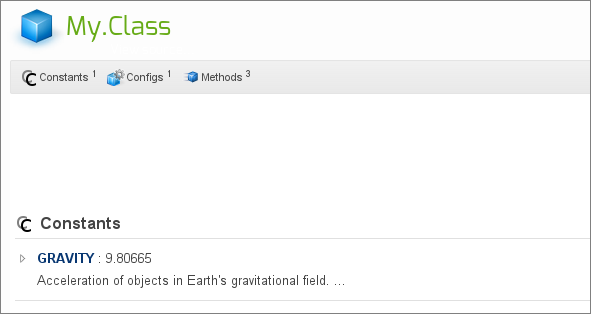-
Notifications
You must be signed in to change notification settings - Fork 240
Standard tags
Often we want to create a tag that uses syntax like this:
@mytag {String/Number} [varname="Hello world"]
We call this a standard tag and there's a simple builtin
way for parsing these: the scanner.standard_tag method:
def parse_doc(scanner, position)
scanner.standard_tag({
:tagname => :mytag,
:type => true,
:name => true,
:default => true,
:optional => true,
})
endThe :tagname field is simply returned as is, the rest are
flags specifying what to parse and return.
-
:type- parses the type definition in curly brackets. -
:name- parses the member name. -
:default- parses the default value after member name. -
:optional- parses the square brackets around the name and default, returningtruewhen they're present andfalsewhen not.
In the case of our example scanner.standard_tag will return
the following hash:
{
:tagname => :mytag,
:type => "String/Number",
:name => "varname",
:default => "Hello world",
:optional => true,
}Let's define a @constant tag which will work just like a
@property, but with the semantic difference of documenting
unchangeable values. For example:
/**
* @constant {Number} GRAVITY=9.80665
* Acceleration of objects in Earth's gravitational field.
*/Here's our implementation:
require "jsduck/tag/tag"
require "cgi"
class Constant < JsDuck::Tag::MemberTag
def initialize
@tagname = :constant
@pattern = "constant"
@member_type = {
:title => "Constants",
:position => MEMBER_POS_CFG - 0.1,
:icon => File.dirname(__FILE__) + "/constant.png",
}
end
def parse_doc(scanner, position)
scanner.standard_tag({
:tagname => :constant,
:type => true,
:name => true,
:default => true,
})
end
def process_doc(context, tags, pos)
t = tags[0]
context[:name] = t[:name]
context[:type] = t[:type]
context[:default] = t[:default]
end
def to_html(member, cls)
member_link(member) + " : " + CGI.escapeHTML(member[:default] || "")
end
endThe initialize should be obvious.
In parse_doc we leave out the :optional flag of
scanner.standard_tag (constants must always have a value).
So when parsing our example code, our parse_doc will
return the following hash:
{
:tagname => :constant,
:type => "Number",
:name => "GRAVITY",
:default => "9.80665"
}Later in process_doc we assign those values separately to the context
hash and JSDuck will already know how to treat them.
Finally in to_html we print out the name of our constant and it's
value (which we also escape with Ruby's standard HTML escaping routine),
so the result looks like this:
